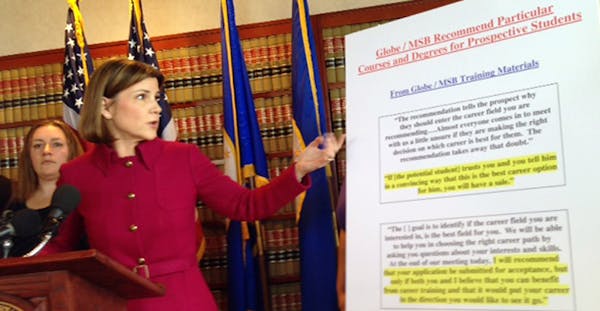BYRON, Minn. — After more than seven years in the military, John Moen decided the Minnesota State Patrol could offer a secure career: a place where skills he picked up in the Navy and Air Force might be put to good use.
He thought the Minnesota School of Business would be his ticket, graduating with a degree in criminal justice.
But after he exhausted nearly all of his GI Bill benefits and took on an additional $40,000 in debt, Moen made a troubling discovery — his degree was virtually worthless in Minnesota. It does not meet the accrediting requirements of the state's police officer licensing board.
In July, Minnesota Attorney General Lori Swanson sued the Woodbury-based Globe University and its sister school, the Minnesota School of Business, accusing the schools of using high-pressure sales tactics to mislead criminal-justice and other students about their job prospects after graduation.
They have become the latest for-profit schools to be targeted for their business practices, particularly their aggressive marketing to GI Bill students, whose taxpayer-funded tuition has often led them to dead ends.
"People have squandered their benefits getting something that wasn't what they expected," Swanson said.
Globe and the Minnesota School of Business said any claims that its admissions and credit transfer policies were deceptive "could not be further from the truth," and the schools have a thorough internal dispute resolution process for unsatisfied students.
A week after Swanson sued the jointly owned Globe and Minnesota School of Business, a U.S. Senate committee released a report condemning for-profit colleges for their increasing reliance on the GI bill for revenue, even as graduation rates falter.
Taxpayers continue to spend twice as much on average to send a veteran to a for-profit college, even though up to 66 percent of those students overall withdraw without a degree or diploma, half within four months, the report said.
The post-Sept. 11 GI Bill program continues to be profitable for those schools, according to an analysis by the Senate's Health, Education, Labor and Pensions Committee. While Globe and the Minnesota School of Business are not mentioned in the report, eight of the top 10 recipients of GI Bill benefits are large, publicly traded companies that operate similar for-profit colleges. In the past four years, they have received $2.9 billion in taxpayer dollars to enroll veterans.
Many of the schools appear to be taking advantage of a loophole to use post-Sept. 11 funds to comply with the requirement that no more than 90 percent of revenues come from federal student aid, the report said.
Seven of those eight companies are under investigation for deceptive and misleading recruiting or other violations of state and federal law, allegations similar to those in the Minnesota suit.
'Deceptive practices'
Globe and the Minnesota School of Business said they provide opportunities to many Minnesotans who might not otherwise be accepted by a traditional college or university.
"I think it's outrageous for anyone, including the Minnesota attorney general, to think a veteran, like myself, or our military-affiliated students, who make informed decisions about putting our lives on the line for our country's freedom, are unable to make an informed decision regarding where to go to college," Mike Hughes, the school's director of Military Services and a retired sergeant first class in the Army, said in a statement.
Swanson's suit seeks to stop the schools "from engaging in deceptive practices, or making false or misleading statements." It also seeks civil penalties and restitution for students' losses.
The suit also accuses the schools, with campuses across the Midwest, including 12 in Minnesota, of deceiving students about their ability to transfer credits to other colleges or universities.
After filing the suit in July, Swanson's office said it was contacted by a number of veterans with complaints ranging from the schools' lack of rigor in its veterinary technician program to allegations that the criminal justice program was oversold.
Swanson said the issue is particularly pointed for vets in the criminal justice program, where the discipline of the military and a sense of service would seem to translate into careers in law enforcement.
No fallback plan
John Moen is now working at a steel processing plant. Any thoughts he had of a law enforcement career are over.
The Minnesota School of Business once held promise for him. Its Rochester campus was close by. It promoted itself as a military friendly school in brochures with saluting soldiers and waving flags. State patrol officers were often in the classroom as instructors.
He finished a four-year degree in two years and nine months but was never told the school wasn't accredited.
"If they were upfront with him, why would you have people in the program?" said his wife, Kristen. "I think it's horrible what they do to people who have served our country."
After discovering his degree would not work for him, Moen said he approached Rochester Community and Technical College about pursuing a business or marketing degree. He was told none of his credits would transfer. He has only about four months of GI Bill benefits left.
"Being a state trooper was our fallback plan. So we essentially no longer have a fallback plan," he said. Only one for-profit school in Minnesota, Rasmussen College, fulfills the requirements for a Peace Officer Standards and Training (POST) Board license. Peggy Strand, education coordinator for the board, said her office frequently receives calls from disgruntled students from for-profit schools like Globe who discover their degree will not lead them to a license.
"I'm not saying the education they received isn't a good education, but it is not leading them to the goal of peace officer education in Minnesota," she said. "Not at all."
Strand said the regional accreditation is the "gold standard" and the board believes the needs of peace officer education in Minnesota are being met by accredited schools.
Globe and the Minnesota School of Business said admissions representatives are clear with prospective students and that all students sign an agreement that the law enforcement degree does not fulfill state requirements.
"The objective of the criminal justice program is to provide an understanding of the theories underlying law enforcement, judicial systems and correctional modalities within the context of social science," the schools said in a statement.
School officials say they have reached out to the POST Board about changing its position, but Minnesota is the only state where it has experienced "this discriminatory practice."
"You can't work in this state"
School officials also provided several vets who said they have had positive experiences with the schools and how their GI Bill benefits are being used, including Neil Doyle, a Minnesota National Guard veteran who also is a county veterans services advocate. After receiving a bachelor's degree from the college, he's finishing a master's in health care management through Minnesota School of Business' Rochester campus.
Marine Corps veteran Stephen Chan, who hopes to work in federal law enforcement with the U.S. Marshals Service, just finished his first quarter.
He said he was fully informed when he enrolled at Minnesota School of Business' Brooklyn Center campus that his degree would not qualify him to be a police officer in Minnesota.
"They had me read a piece of paper and told me to read it back to them. It said, 'You can't work in this state,' " he said.
Cookie baking in biology
Not all the complaints involve the law enforcement program. Navy veteran Libby Grossman enrolled in Globe's veterinary technician program at the Woodbury campus. Two quarters and about $7,000 later, she determined that Globe probably wasn't the school for her.
During a biology final exam she said she was given a recipe for cookies and was told to go home, bake the cookies and bring them back to class.
"This is a college level biology class?" said Grossman, who now is enrolled at Normandale Community College. "I already knew how to bake."

Want to share info with the Star Tribune? How to do it securely

'Safe recovery sites' would offer syringes, naloxone and more to people using drugs. The plan could be in peril.
New Minnesota GOP leaders seek peace with party's anti-establishment wing

Who is Republican Lisa Demuth, Minnesota's first House speaker of color?


